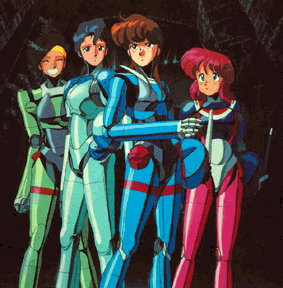![]()
 In addition to the dystopia of MegaTokyo, BGC has a distinctly feminist cyberpunk view [note to gpl: perhaps you or Gene would like to add something here from Harroway, which I haven't read]. Women are nearly always the major victims of Genom's misuse of technology in this series, whether it be the woman friend of Linna's who is hunted down and killed by Boomers in episode 2, or the mother who is killed in a collapsing apartment in episode 3 when Genom tears down the complex to make way for a new industrial facility, or the docile Cynthia from episode 1, by all appearances a human girl but in reality a satellite controlling device who is unaware of her true nature and overseen by Genom (in the form of a "male" Boomer), or Sylvie and Anri, the doomed "sexaroids" in episodes 5 and 6 who were built for recreational purposes but want to escape and live freely like normal humans.
In addition to the dystopia of MegaTokyo, BGC has a distinctly feminist cyberpunk view [note to gpl: perhaps you or Gene would like to add something here from Harroway, which I haven't read]. Women are nearly always the major victims of Genom's misuse of technology in this series, whether it be the woman friend of Linna's who is hunted down and killed by Boomers in episode 2, or the mother who is killed in a collapsing apartment in episode 3 when Genom tears down the complex to make way for a new industrial facility, or the docile Cynthia from episode 1, by all appearances a human girl but in reality a satellite controlling device who is unaware of her true nature and overseen by Genom (in the form of a "male" Boomer), or Sylvie and Anri, the doomed "sexaroids" in episodes 5 and 6 who were built for recreational purposes but want to escape and live freely like normal humans.
Throughout the series, the enemies are predominantly male, whether it be Quincy, the aged president of Genom, or Mason, his opportunistic subordinate, or Largo, the android construct which is built with Mason's original brain patterns. But in this context, the Knight Sabers can be seen as empowered women, as they are able to continuously foil Genom's plans through their use of similar technology; in effect, they have one-upped the males at their own game. Compare the way that the Sabers swing into battle and work as a team to Leon's inadequacy when he gets a chance to wear a combat suit of his own. But the Sabers' strength isn't restricted only to their battlesuits; when they are living the civilian life, they are very much their own women. Priss successfully rejects nearly every advance Leon makes towards her, Linna runs through a new boyfriend every week, but there's no doubting who's in charge in each situation, and Nene doesn't feel obligated to go on diets or increased training to be recognized as worthy by the team. In fact, one of the best things about BGC is the unabashed attention that the four protagonists receive.
The strength and liveliness of their characters might be slightly out of step with cyberpunk's typical anti-heroes, but they serve as a sign of optimism in an otherwise pessimistic vision. Their rebellion against the overrunning of technology might be what Larry McCaffery describes in Storming the Reality Studio when he writes of a general public that needs to "create ways of using...technology for our own purposes before we all become mere software, easily deletable from the hard drives of multinationalism's vast mainframe." (12)
![]()